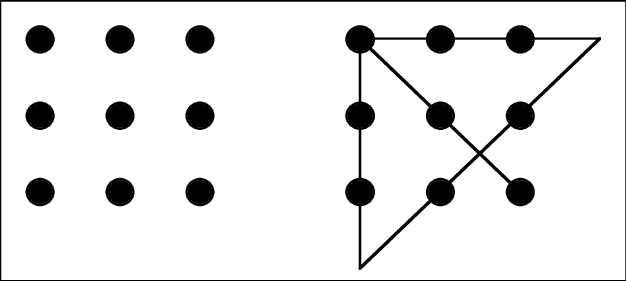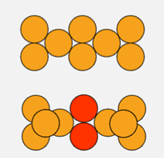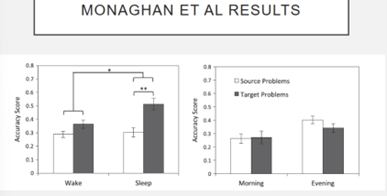Cognitive Psychology - Insight & Analogy
1/14
There's no tags or description
Looks like no tags are added yet.
Name | Mastery | Learn | Test | Matching | Spaced |
|---|
No study sessions yet.
15 Terms
Insight
A change in conceptual understanding that allows a solution to a problem to be discovered and repeated in the future.
Incubation
Leaving a problem and coming back to it.
What is the 9 Dot Problem and phenomenon involved?
Task that is simple to state but hard to solve. Involves cancelling 9 dots using straight lines, the solution requires insight and thinking outside the box.
Phenomena involved:
Fixation
Impasse
“Aha”
Incubation

What do Gestalt principles suggest about problem-solving?
The perceptual whole can limit moves or solutions.
Name the important aspects of Insight
Consciousness (Do we control our own thinking?)
Determinism (Productive vs. reproductive thought?)
Modularity (Is insight a ‘special process’?)
Name the three main theories of insight.
Representational Change Theory (Knoblich et al., 1999)
Criterion of Satisfactory Progress (MacGregor et al., 2001)
Multiple Factor Theory (Kershaw & Ohlsson, 2004)
Representational Change Theory (Knoblich et al., 1999)
Theory of insight, which suggests it is what you know that makes a problem hard.
Criterion of Satisfactory Progress Theory (MacGregor et al., 2001)
Theory of insight, which suggests it is what you do that makes a problem hard.
Multiple Factor Theory (Kershaw & Ohlsson, 2004)
Theory of Insight, which suggests problem-solving is influenced by:
Perceptual factors (Gestalt)
Knowledge factors
Search factors
Insight emerges when a problem solver overcomes these limitations by restructuring a problem’s representation.
What is the goal of the Eight Coin Problem and how is it solved?
To make each coin touch exactly three others by moving only two coins. The solution requires the use of 3 dimensions. 3D visual hints helped the most (compared to verbal)

What did Gick & Holyoak (1980) discover about analogical problem-solving?
Found in the Fortress and radiation problem 92% found the solution with a hint (compared to only 20% with no hint).
9-Ball Problem
Task in which either 7 or 9 Balls have to be weighed to find the heaviest one. Participants either have £8/£12 or No Cost. On the 7-ball problem, with no cost, the percentage of correct solutions was highest. However, on the 9-ball problem solutions were higher when participants only had £8 as they learned through training not to make unnecessary mistakes/moves. This indicates experiencing a failure in a problem can cause the heuristic applied to change, improving solving.
Nuclear Reactor Problem
Task where you have to identify the faulty plutonium rod (out of 8) with only two tests.
How does incubation influence thinking and insight?
Incubation aids:
Divergent thinking
Linguistic Insight (if low cognitive load)
Visual Insight (after lengthy preparation)
How does sleep affect insight?
Sleep enhances insight as it promotes analogical transfer in problem-solving (Monaghan et al., 2015).
